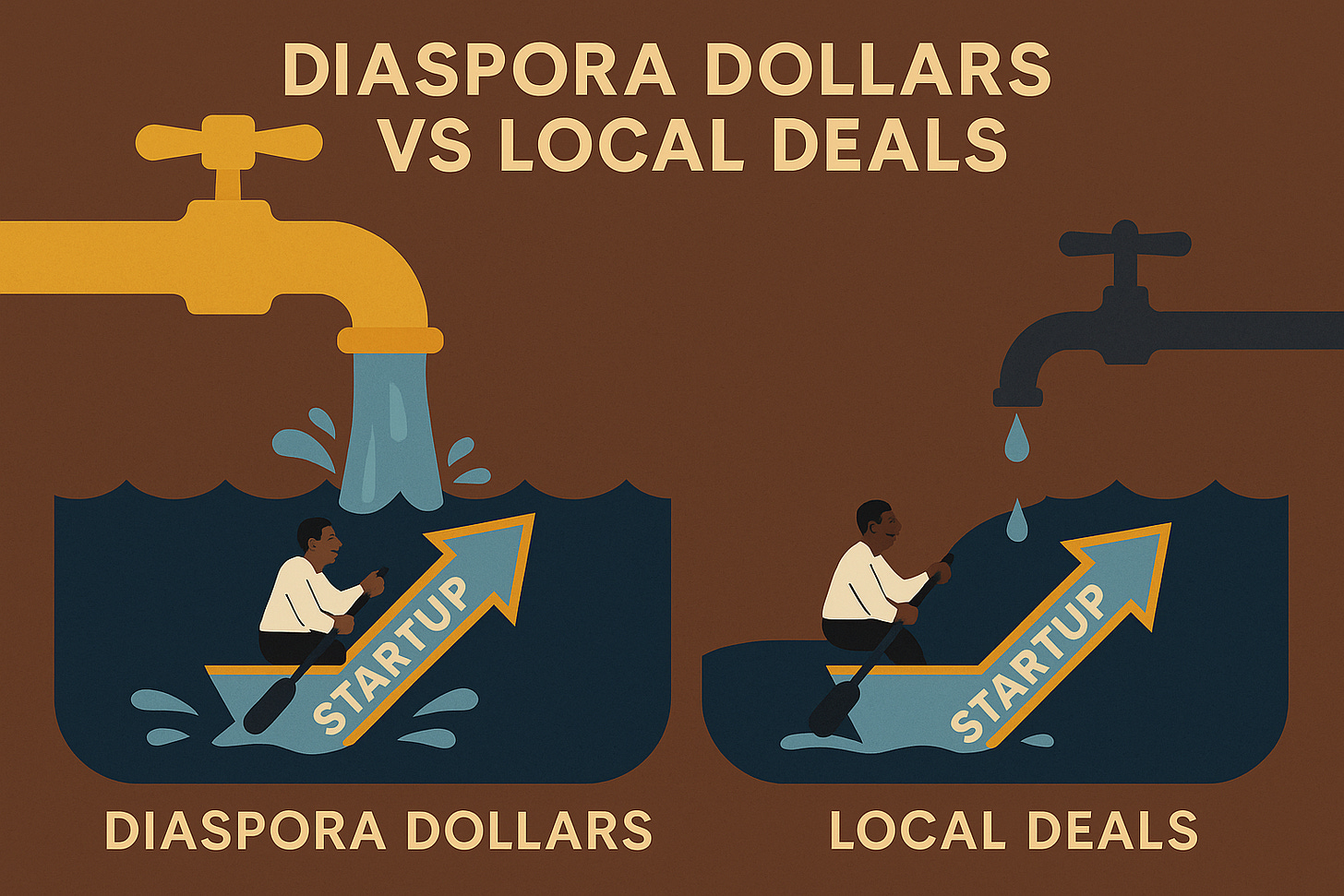The $10 Customer Problem
Why African Startups Must Monetize Abroad Before Scaling at Home
Many African startups are building for customers who can’t pay — and raising from investors who won’t wait.
That tension isn’t visible on pitch decks. But it sits beneath most failures on the continent:
Products built for cash-poor markets, funded by capital priced for hypergrowth.
Founders chase MoUs with ministries. VCs underwrite like it’s enterprise SaaS.
One side is dreaming of scale. The other just wants to be paid.
The Local Market Reality
Build for your own community. Solve meaningful problems.
The logic feels unassailable — until you run the numbers.
Most African SMEs can’t pay more than $15–20/month for software.
Government contracts move slowly, get tangled in politics, and often go unpaid.
B2B distribution demands offline relationship-building that burns cash faster than traction accumulates.
📍 Case Study: The Education MoU That Killed a Startup
In 2021, a Nigerian edtech company signed MoUs with two state governments to digitize public schools. The team scaled aggressively off pre-seed funding: hired sales reps, leased Abuja office space, deployed hundreds of tablets.
But the MoUs weren’t binding. No payment guarantees. No advance invoices.
When elections brought in new leadership, everything stalled. Fourteen months later, the company shut down.
Now consider the alternative: targeting UK-based African heritage schools, US diaspora churches, or parent-led cultural co-ops.
They’re harder to reach upfront — but faster to pay, FX-backed, and mission-aligned. Less politics, more payments.
Sometimes, the institutions that feel “local” are structurally riskier than those abroad that actually value what you’re building.
Diaspora Economics: Beyond the Remittance Frame
Remittances show what gets sent back. That’s a generosity metric — not a commercial one.
Diaspora households often earn 3–5x more than what appears in remittance data.
That’s the real market. Not the money sent home — the income kept abroad and spent with intent.
This is where diaspora income is already flowing:
Parents abroad paying $300/month for online Yoruba or Swahili tutoring
Professionals hiring remote legal, accounting, or creative services from home
Entrepreneurs outsourcing back-office ops to trusted teams in Lagos, Nairobi, Accra
Tech-enabled local BPOs powering diaspora-run clinics, logistics firms, and agencies — with African talent, tech-enabled workflows, and reliable revenue
These are bankable categories.
They just don’t show up in most startup pitch templates.
Diaspora emotion doesn’t convert. Diaspora income does — and it’s already in motion.
Strategic Sequencing: The IrokoTV Lesson
Going diaspora-first isn’t a pivot. It’s a survival tactic.
Jason Njoku originally built IrokoTV for local viewers.
But Nigeria’s broadband and payment infrastructure made monetization nearly impossible.
The team turned to diaspora subscribers in the UK and US — people who missed Nollywood and could pay for it.
That FX revenue gave Iroko runway, stability, and options.
They didn’t abandon Nigeria. They bought time.
Build locally. Monetize globally. Expand homeward when margins make it viable.
This isn’t an isolated case.
Partech reports that ~40% of African startups that raised Series A in 2023–2024 generated meaningful diaspora revenue within their first 18 months.
Capital Allocation: What Has to Shift
For Founders:
Product–market fit doesn’t matter if the market can’t pay.
Test FX-backed, diaspora-aligned demand early — even if it feels further away.
For Investors:
Push for global revenue exposure before scaling local headcount.
“Traction” in low-yield markets often becomes a fundraising story disconnected from margin reality.
For Fund Managers:
Stack your capital intelligently:
VC for scalable diaspora/digital monetization
Grant or DFI capital for infrastructure-heavy local plays
Track diaspora household income, consumption patterns, and channel behavior — not just remittance volumes or GDP slides.
The diaspora is a structured export market — with FX liquidity, cultural alignment, and real operating leverage.
The Path Forward
Local focus isn’t the problem. Premature local monetization is.
Survival depends on sequencing, not sentiment.
The future of African innovation may be local.
But the companies that survive long enough to build it are monetizing abroad — right now.
Your mission can be pan-African.
Your early customers don’t have to be.
🧠 Coming Next (for paid subscribers):
This was the lens. The next drops are the toolkit:
💰 Diaspora Revenue Playbook
Business models, pricing strategies, and payment rails that work across UK/US/Africa📊 The Diaspora Demand Matrix
Segmenting buyers by wallet size, service need, and acquisition cost⚖️ Structuring for Dual Markets
Legal, tax, and operational traps when selling globally but delivering locally
→ Get the next post (and access to the full toolkit series) by subscribing to the paid tier.



Thank you so much for this Masterpiece Sir.
Thank you so muchnfornthis Masterpiece Sir.